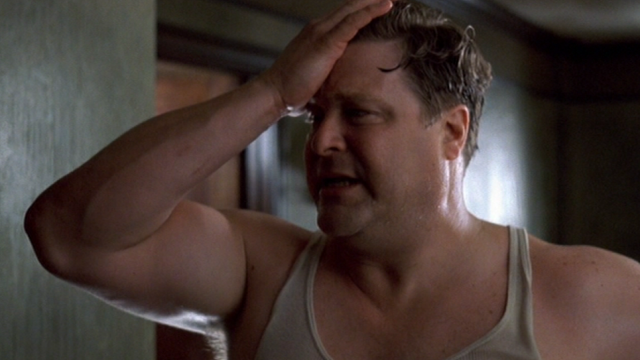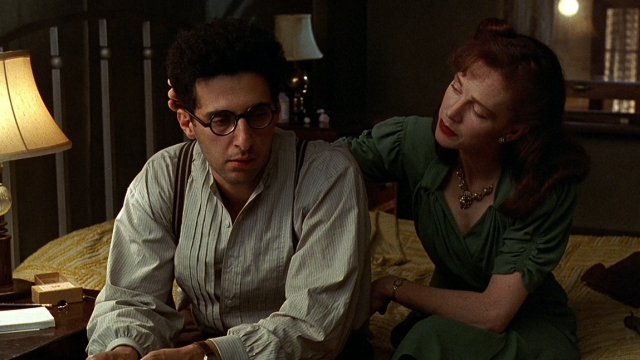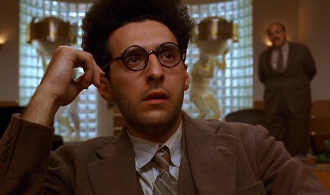With the multitude of films that are released every year, sometimes one just falls through the cracks. Today, we’re reviewing The Coen Brothers’ Barton Fink just in case you missed it…
From indie darlings to Academy Award winners, the Coen brothers have always marched to the beat of their own drum. Over the years, Joel and Ethan Coen have consistently pumped out quality films. Sure, their work certainly isn’t for everybody but, as a fan, it’s hard to find a misstep from them. While they receive heaps of praise for films like Fargo, The Big Lebowski, and No Country for Old Men, it’s easy to forget how great their early work is as well. Such is the case with their 1991 film, Barton Fink.
The creative process of Barton Fink was actually quite unconventional. The screenplay was written in three weeks while the Coens were working on their 1990 film, Miller’s Crossing. They actually suffered from writer’s block and took a short break from Miller’s Crossing to write the script for Barton Fink. While it may not have the cult following of the aforementioned films, Barton Fink is every bit of classic Coen material. There are instances of drama, suspense, and, as always, comedy. The Coens regularly craft inconsequential stories that somehow result in the most dire of consequences.
The plot centers on the title character, played by John Turturro, as a playwright in the 1940’s making the jump to Hollywood. He shacks up at the crummy Hotel Earle where the wallpaper is peeling and he’s constantly attacked by a mosquito. Barton is employed by Jack Lipnick (Michael Lerner) from Capitol Pictures to write a formulaic script for a wrestling picture. Unfortunately for Barton, he suffers from writer’s block (as the Coens did before working on this film). As he tries to overcome his issue, he seeks assistance from writer Bill Mayhew (John Mahoney), Bill’s secretary, Audrey Taylor (Judy Davis), and his neighbor, an uppity insurance salesman named Charlie Meadows (John Goodman).

As is standard in all Coen brothers’ films, the cast is stellar. Even this early into their career, frequent contributors such as Turturro, Goodman, Steve Buscemi, and Jon Polito already established a rapport with the directors. Specifically, John Turturro puts in one of the best performances of his career while Michael Lerner landed a nomination for Best Actor in a Supporting Role at the Oscars. Also, what more can be said about John Goodman? He absolutely nails every role he’s cast in and is phenomenal as Charlie Meadows. He’s extremely likable while also being an odd duck in his own right.
Another Coen brothers staple is offbeat humor. Barton Fink is chocked full of it. Whether it’s Charlie’s enthusiastic rambling, Mayhew’s drunken shouting, or Lipnick’s contradictory ranting, there’s constantly witty banter between characters. What enhances it more is Barton’s befuddled reactions to the majority of it. He’s a mostly soft-spoken character with his only real passion being theater. Other than a few rousing speeches about the plight of the common man in theater, Barton mostly accepts mental and verbal abuse from others.

The best thing about Barton Fink, though, is its assessment of the Hollywood studio system. Barton is employed because of how well received one of his plays is. Lipnick and Capitol Pictures want “that Barton Fink feeling” in their wrestling movie yet aren’t receptive to Barton’s ideas. They like the idea of having his name but don’t really care about his actual creative input. Contrarily, the Coens themselves mostly stray away from big budget productions. They are the architects of their films from top to bottom in terms of directing, writing, and even editing. The contrivance of the studio system is brought to light and poked fun at constantly throughout this film.
Barton Fink may not be the Coen brothers’ best work, but it has many of their greatest traits. Between early connections with some of their frequent collaborators and the comedy alone, there’s plenty to like. It’s also interesting to see their critique on the nature of Hollywood so early in their careers. Again, Barton Fink won’t change anyone’s mind about the Coens but for fans of their films, it’s absolutely worth watching. It has all of the best things about their work crafted by their quirky, self-indulgent, one-of-a-kind style.




